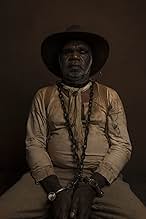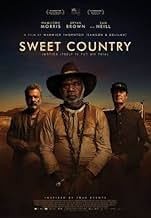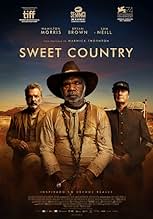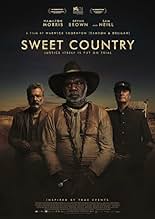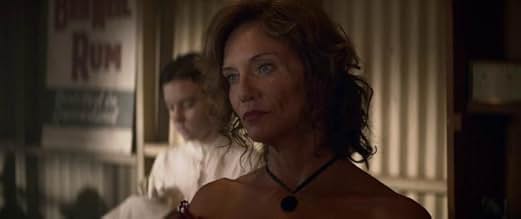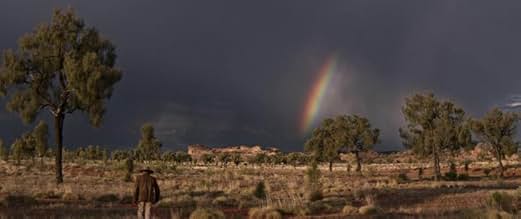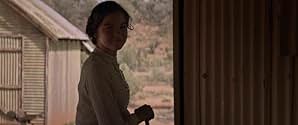IMDb रेटिंग
6.9/10
9.8 हज़ार
आपकी रेटिंग
अपनी भाषा में प्लॉट जोड़ेंWestern set on the Northern Territory frontier in the 1920s, where justice itself is put on trial when an aged Aboriginal farmhand shoots a white man in self-defense and goes on the run as a... सभी पढ़ेंWestern set on the Northern Territory frontier in the 1920s, where justice itself is put on trial when an aged Aboriginal farmhand shoots a white man in self-defense and goes on the run as a posse gathers to hunt him down.Western set on the Northern Territory frontier in the 1920s, where justice itself is put on trial when an aged Aboriginal farmhand shoots a white man in self-defense and goes on the run as a posse gathers to hunt him down.
- पुरस्कार
- 22 जीत और कुल 29 नामांकन
Natassia Gorey Furber
- Lizzie
- (as Natassia Gorey-Furber)
Lachlan J. Modrzynski
- Constable Campbell
- (as Lachlan Modrzynski)
फ़ीचर्ड समीक्षाएं
When a good cinematographer gets behind a movie landscapes reveal all their beauty and possibilities, and movies become as much about art as about a story. Such is the case here. The story itself is a very real example of what aboriginals in Australia must have suffered for decades. As such it is a most important document. The story is more than that though, and is a very sober and insightful look at the depth, or lack of depth, in people's characters, both for the oppressed and the oppressors. And it has some surprising moments, is genuinely authentic, and leads us to a very real hero. Fantastic performances by all the cast, this is a very fine example of Australian film.
When Australian cinema is good ,its usually really good and this one can hold its head high in any cinema in the world.
Director Warwick Thornton who also made Samson and Delilah has excelled again with this Aussie period Western set in 1929 in the Northern Territory.
It has the feel and ingredients of a Western , the Lawman, the fugitive, the posse, even the Saloon gal and the town vigilantes but Its much more than an action Western and even reminded me at times of Harper Lee's To Kill a Mockingbird set in the Australian outback.
The stars are Hamilton Morris as Sam the hunted fugitive Aboriginal stockman and Bryan Brown as Sergeant Fletcher the hunter .
Sam Neill as the minister, is also terrific in his role , showing the only compassion and acceptance to the indigenous population in the entire movie and Matt Day as the judge is also impressive.
The cinematography is superb and at times resembles an Albert Namatjira landscape, which is understandable but it takes great skill to capture the light and timelessness of the outback landscape, it should wow overseas audiences .
After the dismal film we saw yesterday this was a joy to watch and what good cinema is all about.
Using the Hollywood label 'western' for an Australian outback drama casts an odd cultural shadow over the achievements of Sweet Country (2017). At a Q & A preview in Sydney, director Warwick Thornton told the audience "people think in boxes so we need to call it something". However, 'western' is an awkward box for an Australian tale of such contemporary relevance and cinematic beauty.
Set in 1920s outback Northern Territory, the narrative is deceptively simple. Indigenous farm hand Sam Kelly (Hamilton Morris) and his wife are lucky to work for god-fearing landowner Fred Smith (Sam Neill) who believes that all are created equal. Fred allows Sam to help his unstable war-veteran neighbour Harry March (Ewan Leslie) for a few days but it sours quickly and Sam kills Harry in self-defence. The rest of the story tracks the hunt led by Sergeant Fletcher (Bryan Brown) through treacherous country that is home for Sam. Eventually white man's justice must be faced.
This is an outstanding film for many reasons. In terms of visual impact, it is stunning. The cinematography shows a deep love of country with majestic panoramas that dwarf humans. Rich red colour palettes evoke the hot, dry, heartland of an ancient land. The camera tracks seamlessly from wide-screen images to small details like a balletic sand scorpion or a cold hard bullet being loaded into a chamber. Scene after scene, we find symbols of the conflicted relationship between white man and nature; there are no words more jarring than to hear Indigenous people being referred to as "black stock".
In terms of aural impact, silence has never been so beautiful. It takes some time into the film before we notice there is no musical score, and none is needed. As Thornton put it, when you stand in the desert there are no orchestral violins to tell you what to feel. Silence conveys the outback. You hear the rustle of leaves in the wind, the sound of a flowing river, horses' hooves pounding the ground, and most confronting: the sound of a heavy chain being dragged across desert sand, manacled to the black hand of a fleeing Indigenous youth.
The casting is excellent. Bryan Brown and Sam Neill are almost cameo performers in their roles as hard-core outback characters. The emotional centre of the film, however, is Hamilton Morris. He speaks little and emotes even less. His face is a wide, impassive, deeply etched, and painful canvas that speaks of Indigenous people's dispossession and barbaric mistreatment by armed invaders. Views will differ over whether the Johnny Cash cowboy ballad during the credits makes this more or less of an Australian story. This powerful but disturbing film reminds Australians of our history and need to reconcile with the past.
Set in 1920s outback Northern Territory, the narrative is deceptively simple. Indigenous farm hand Sam Kelly (Hamilton Morris) and his wife are lucky to work for god-fearing landowner Fred Smith (Sam Neill) who believes that all are created equal. Fred allows Sam to help his unstable war-veteran neighbour Harry March (Ewan Leslie) for a few days but it sours quickly and Sam kills Harry in self-defence. The rest of the story tracks the hunt led by Sergeant Fletcher (Bryan Brown) through treacherous country that is home for Sam. Eventually white man's justice must be faced.
This is an outstanding film for many reasons. In terms of visual impact, it is stunning. The cinematography shows a deep love of country with majestic panoramas that dwarf humans. Rich red colour palettes evoke the hot, dry, heartland of an ancient land. The camera tracks seamlessly from wide-screen images to small details like a balletic sand scorpion or a cold hard bullet being loaded into a chamber. Scene after scene, we find symbols of the conflicted relationship between white man and nature; there are no words more jarring than to hear Indigenous people being referred to as "black stock".
In terms of aural impact, silence has never been so beautiful. It takes some time into the film before we notice there is no musical score, and none is needed. As Thornton put it, when you stand in the desert there are no orchestral violins to tell you what to feel. Silence conveys the outback. You hear the rustle of leaves in the wind, the sound of a flowing river, horses' hooves pounding the ground, and most confronting: the sound of a heavy chain being dragged across desert sand, manacled to the black hand of a fleeing Indigenous youth.
The casting is excellent. Bryan Brown and Sam Neill are almost cameo performers in their roles as hard-core outback characters. The emotional centre of the film, however, is Hamilton Morris. He speaks little and emotes even less. His face is a wide, impassive, deeply etched, and painful canvas that speaks of Indigenous people's dispossession and barbaric mistreatment by armed invaders. Views will differ over whether the Johnny Cash cowboy ballad during the credits makes this more or less of an Australian story. This powerful but disturbing film reminds Australians of our history and need to reconcile with the past.
I saw this film on 25th January with my granddaughter who is Aboriginal. Most fitting on the eve of the last day of freedom for Indigenous people. A very moving film that brought home and really reminded us of the cruel and widely hidden history of this country. Should be compulsory viewing for all high school students and used as a starting point for students to explore and examine their local Indigenous history. I hope to be able to buy a copy in the near future.
It's tempting to say that I wanted to like "Sweet Country" more than I did, but I have used that line before, and I think it should kind of go without saying: of course I wanted to like it. I don't watch movies wanting to hate them.
However, the line seems relevant in this case because "Sweet Country" starts so promisingly. It's well shot and located, and features Sam Neill, Bryan Brown, and the long absent Matt Day (remember him?).
Trouble is, the movie seriously lost me in its middle section. I stopped paying attention to it. It needed more... something on the screen to focus on during all the silence and loose activity. It was overlong, like every other movie made these days.
The plot is, of course, about the trial of an Aborginal man who kills a "whitefella" in self defense. Something similar has already been done, and better, in "The Chant of Jimmie Blacksmith", which is a masterpiece. This one is too long and empty, like the part of the country it's set in.
However, the line seems relevant in this case because "Sweet Country" starts so promisingly. It's well shot and located, and features Sam Neill, Bryan Brown, and the long absent Matt Day (remember him?).
Trouble is, the movie seriously lost me in its middle section. I stopped paying attention to it. It needed more... something on the screen to focus on during all the silence and loose activity. It was overlong, like every other movie made these days.
The plot is, of course, about the trial of an Aborginal man who kills a "whitefella" in self defense. Something similar has already been done, and better, in "The Chant of Jimmie Blacksmith", which is a masterpiece. This one is too long and empty, like the part of the country it's set in.
क्या आपको पता है
- ट्रिवियाThe film is based on a real life true crime murder case where an Aboriginal man was arrested and put on trial for murdering a white man in central Australia during the 1920s.
- गूफ़Under Australian law, an execution would not be carried out immediately (or the next day), as executions would need to be confirmed by the State Governor. There also be time allowed for appeals against the death sentence.
- भाव
Fred Smith: We're all equal here. We're all equal in the eyes of the Lord.
- कनेक्शनFeatured in Sweet Country: Behind the Scenes (2018)
- साउंडट्रैकDown at Long Point
Written and Performed by Damien Lane
टॉप पसंद
रेटिंग देने के लिए साइन-इन करें और वैयक्तिकृत सुझावों के लिए वॉचलिस्ट करें
- How long is Sweet Country?Alexa द्वारा संचालित
विवरण
- रिलीज़ की तारीख़
- कंट्री ऑफ़ ओरिजिन
- आधिकारिक साइटें
- भाषाएं
- इस रूप में भी जाना जाता है
- Dulce país
- फ़िल्माने की जगहें
- उत्पादन कंपनियां
- IMDbPro पर और कंपनी क्रेडिट देखें
बॉक्स ऑफ़िस
- US और कनाडा में सकल
- $1,04,297
- US और कनाडा में पहले सप्ताह में कुल कमाई
- $8,895
- 8 अप्रैल 2018
- दुनिया भर में सकल
- $18,10,021
- चलने की अवधि
- 1 घं 53 मि(113 min)
- रंग
- ध्वनि मिश्रण
- पक्ष अनुपात
- 2.35 : 1
इस पेज में योगदान दें
किसी बदलाव का सुझाव दें या अनुपलब्ध कॉन्टेंट जोड़ें


